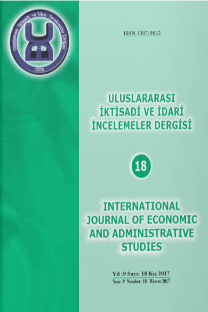PARTY COMPETITION AND EUROPEAN INTEGRATION: A COMPARISON OF WESTEAST AND CANDIDATE COUNTRIES
___
Arnold, H. (2007). Political Arguments Against Turkey’s Accession to the European Union, Internazionale Politik und Gesellschaf 3, 101-113.Budge, I. (2000). Expert Judgments of Party Policy Positions: Uses and Limitations in Political Research, European Journal of Political Research, 37(1), 103–113.
Erdogdu, E. (2002). Turkey and Europe: Undivided but not United, Middle East Review of International Affairs, 6(2), 40-51
Franklin, M. (1992). The Decline of Cleavage Politics. In Mark Franklin, T. Mackie and Henry Valen (Eds.), Electoral Change: Responses to Evolving Social and Attitudinal Structures in Western Countries. Cambridge, UK, Cambridge University Press.
Grigoriadis, I.N. (2006). Turkey’s Accession to the European Union: Debating the Most Difficult Enlargement Ever, SAIS Review, 26(1), 147-160.
Hix, S. and Lord, C. (1997). Political Parties in the European Union, New York, St. Martin’s.
Hix, S.(1999a). Dimensions and alignments in European Union Politics: Cognitive Constraints and Partisan Responses”, European Journal of Political Research, 35: 69-125.
Hix, S. (1999b). The political system of the European Union, London, Macmillan.
Hooghe, L., and Marks, G. (1999). Making of a Polity: The Struggle Over European Integration. In Herbert Kitschelt, Peter Lange, Gary Marks and John Stephens (Eds.), Continuity and Change in Contemporary Capitalism (pp. 70-97). Cambridge, UK, Cambridge University Press.
Hooghe, L., Marks, G. and Wilson, C. (2002). Does Left/Right Structure Party Positions on European integration?, Comparative Political Studies, 35, 965-989.
Inglehart, R. (1990). Cultural Shift in Advanced Industrial Society, Princeton, NJ, Princeton University Press.
Inglehart, R. (1997). Modernization and Postmodernization, New Jersey, Princeton University Press.
Ladrech, R. (1994). Europeanization of Domestic Politics and Institutions: The Case of France, Volume 32, 1, 69–88.
Lane, D. (2002). The Legacy of State Socialism and the Future of Transformation, New York, Rowman and Littlefield.
Lipset, S. and Rokkan, S. (1967). Cleavage Structures, Party Systems and Voter Alignments: An introduction”. In Seymour M. Lipset and Stein Rokkan (Eds.), Party Systems and Voter Alignments: Crossnational Perspectives, 1-64, New York, Free Press.
Marks, G. and Wilson, C. (2000). The Past in the Present: A Cleavage Theory of Party Response to European Integration, British Journal of Political Science, 30, 433–459.
Marks, G., Hooghe, L., Nelson, M. and Edwards, E. (2006) Party Competition and European Integration in the East and West : Different Structure, Same Causality, Comparative Political Studies, 39, 155.
Marks, G., Hooghe, L., Steenbergen, M. and Bakker, R. (2007). Cross-Validating Data on Party Positioning on European Integration, Electoral Studies, 26(1), 23-38.
Marks, G., Wilson, C. and Ray, L. (2002). National Political Parties and European Integration, American Journal of Political Science, 46(3), 585-594.
Öniş, Z. (1999). Turkey, Europe and Paradoxes of Identity: Perspectives on the International Context of Democratization, Mediterranean Quarterly, 10(3), 107-136
Steenbergen, M. and Marks, G. (2007). Evaluating Expert Judgments, European Journal of Political Research, 46, 347–366.
Tavits, M. and Letki, N. (2009). When Left is Right: Party Ideology and Policy in Post-Communist Europe, American Political Science Review, 103, 555-69.
Tsebelis, G and Garrett, G. (2000). Legislative Politics in the European Union, European Union Politics, 1(9), 9-36.
Williams, S. (1990). Sovereignty and Accountability in the European Community, The Political Quarterly, 61(3), 299-317.
- ISSN: 1307-9832
- Yayın Aralığı: 4
- Başlangıç: 2008
- Yayıncı: Kenan ÇELİK
Ümit hasan GÖZKONAN, Füsun KÜÇÜKBAY
TÜRKİYE’DE E-FATURA BAŞVURU SÜRECİ VE KULLANIMI
TÜRKİYE’DE YENİLENEBİLİR ELEKTRİK ENERJİSİ ÜRETİMİNİN BELİRLEYENLERİ
PRICE TRANSMISSION BETWEEN GOLD, SILVER, COPPER PRICES AND MINING INDEX IN TURKEY
Füsun KÜÇÜKBAY, Ümit Hasan GÖZKONAN
TÜRKİYE’DE MOBBİNG İLE İLGİLİ SAĞLIK ALANINDA YAZILAN LİSANSÜSTÜ TEZLERİN İNCELENMESİ
KAMU POLİTİKASI AKTÖRÜ OLARAK DÜŞÜNCE KURULUŞLARI VE DEĞİŞEN ROLLERİ
PARTY COMPETITION AND EUROPEAN INTEGRATION: A COMPARISON OF WEST-EAST AND CANDIDATE COUNTRIES
